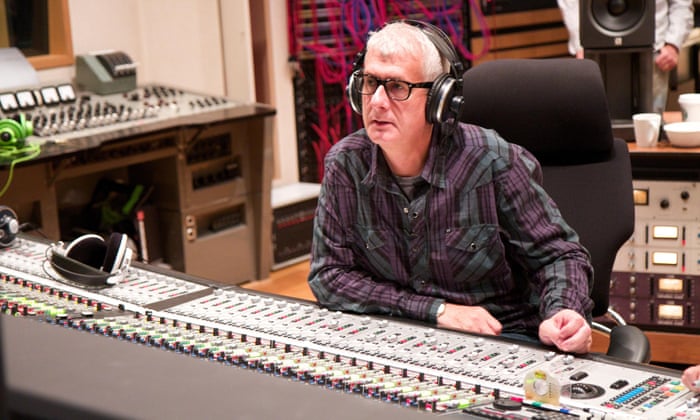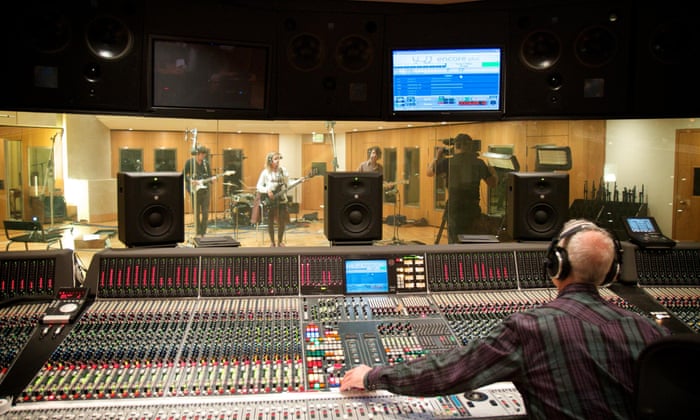
Music producer Steve Levine always knew he wanted a career in music. “I grew up listening to the sound of reggae, ska and Motown in the early 1960s. From a very young age, I wanted to make records – but initially, I wanted to be a sound engineer.”
Despite his ambitions he left school in 1975 with no qualifications. “In those days, there wasn’t the lovely range of sound technology university courses there are nowadays,” he says. He decided to knock on doors of recording studios in London, to ask if they had a vacancy for a “tape op”.
“A tape op was the assistant sound engineer’s assistant, who would wind the tape back to wherever the producer wanted, ready to do the next recording. You were effectively a human remote control – and the teaboy,” he adds.
CBS, the fifth studio he tried, had just such a vacancy. Levine started the following Monday, aged 17.
The label encouraged all of its junior sound engineers to demo potential new bands they might be interested in signing. “That’s how I got the opportunity to work with bands like the Clash.” By the tender age of 20, Levine was an experienced sound engineer. “Then one day, Bruce Johnston from the Beach Boys said to me ‘Steve, you should be a producer, not an engineer. You’re full of ideas. Bands would love to hear what you have to say.’”
He started producing his own records in his spare time, using CBS studios. “That was a stretch too far for CBS and I got the sack.” Luckily, his existing clients wanted to continue working with him and recommended him to other bands.
Soon he got a call from the A&R department at EMI Records, praising his production of a record played on Capital Radio and asking for a meeting. “I started working on demos for some of their new acts. The manager of one of these acts, Tony Gordon, was interested in managing Culture Club and so he sent Jon Moss [the drummer] to see me.” At that time the band was still in its infancy. “I offered to do some demos for them for EMI in January 1982 and was very excited by the sound we recorded.”

Levine advises aspiring producers to attend a specialist university that offers sound technology courses. Photograph: Harman
The band eventually signed with Virgin Records and kept Levine on as producer. “We made two records that bombed. Do You Really Want to Hurt Me? was the third record we made and within a few seconds of its release, Radio 2 made it their record of their week – and bang! It just went through the roof.”
Levine went on to produce all of Culture Club’s hits and the band’s three multi-platinum albums. He won a Brit award and a Grammy for his work as a producer and set up his own record label, Hubris Records. Yet he has never had any formal musical training. “I don’t think you necessarily need to be a good musician to become a record producer,” he says. “You do need to have a good sonic ear, so you can hear sound and help a band realise the sound ideas they have in their head.
“Often, it’s very hard for a band to achieve the sound they want because they don’t know what equipment to use and haven’t learned the craft of record production –the little tricks that can have such an impact on the way sound is recorded.”
There are, however, some producers who have no record production knowledge, but are great “vibe merchants”, says Levine. “These producers are able to make a band work harder. They create an atmosphere where the band is open to trying new ideas and avenues they would never otherwise have gone down. They’re enablers.”
You need to be diplomatic, he says, and good with people. “You have to listen to a band, understand what they want and have the patience to allow them to experiment with their arrangements. You might ask questions like: Could you try to make that verse twice as long, or perhaps shorten it? What about another chorus here? What about speeding it up or slowing it down?”
What career advice would he offer to would-be music producers today? “Go to a specialist university that offers sound technology courses, which are almost like physics courses. I myself present production masterclasses at the Liverpool Institute of Performing Arts (Lipa), where they have very specific courses for people who want to be sound engineers and record producers.”
Advertisement
The skill set you’ll leave such a course with, he says, is very transferrable. “It doesn’t matter whether you want to work in a theatre, recording studio, TV studio, or with a band live on stage. The basic understanding and knowledge you’ll learn about recording and microphone placement will apply to all of those.”
If you can’t afford to go on a course, find a local band you like and offer to help them with their live and recorded sound, he advises. Split the profits of any records you produce 50/50 with the artists. “Most bands early on in their career cannot afford to have a sound engineer with them, and yet it’s one of the most valuable skill sets they need. Build a relationship with a band and you’ll learn your craft – and if the band then becomes successful, you’ll be part of that.”
Most important of all, he adds, you’ll hone your ability to spot an idea with potential. “A record producer needs to be able to hear 20 of the band’s ideas and throw them all in the bin – except for one sentence of half-formed idea number 19.
“Finding that little detail, those one or two elements you think you can bring out, that no one else can see, that’s what makes a successful record – and a great record producer.”
[TheGuardian]
